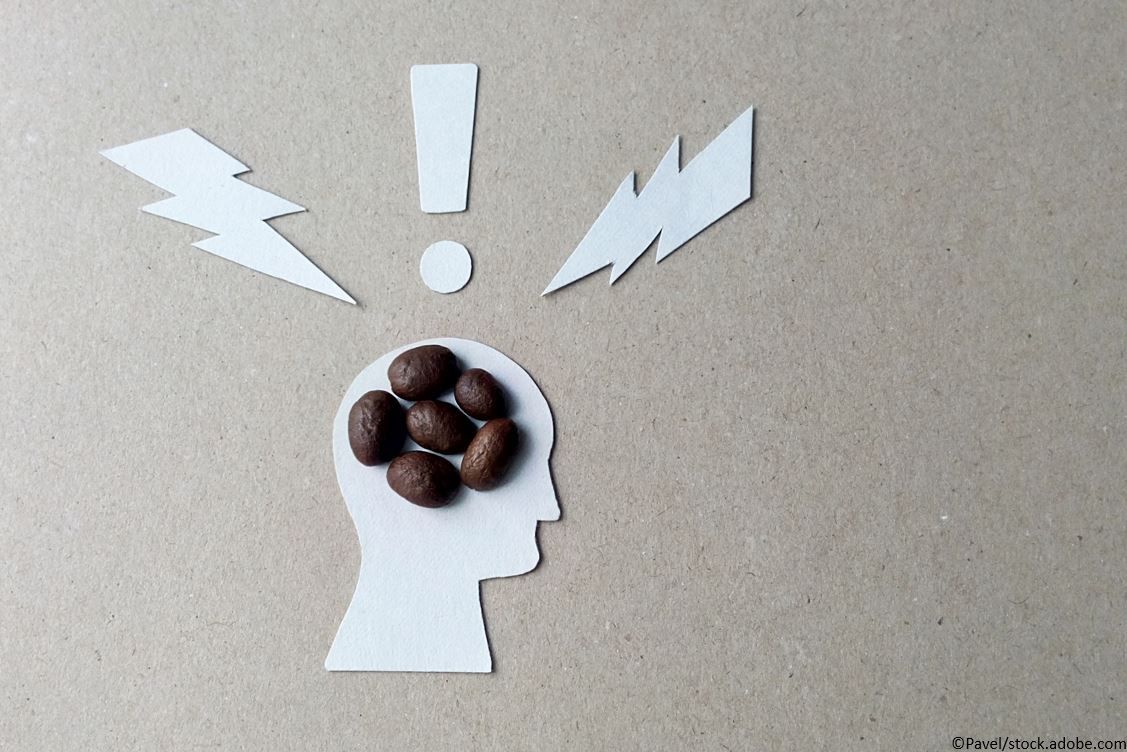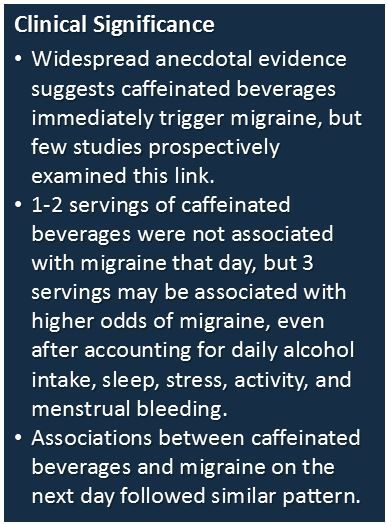- Clinical Technology
- Adult Immunization
- Hepatology
- Pediatric Immunization
- Screening
- Psychiatry
- Allergy
- Women's Health
- Cardiology
- Pediatrics
- Dermatology
- Endocrinology
- Pain Management
- Gastroenterology
- Infectious Disease
- Obesity Medicine
- Rheumatology
- Nephrology
- Neurology
- Pulmonology
Migraine Risk is Brewing Among Heavy Caffeine Drinkers
A cup of coffee/day keeps migraine away? It can, but before recommending another cup to migraine patients, review findings just published.

How much caffeine is too much for migraine patients? According to a new study published in The American Journal of Medicine, migraine sufferers should refrain from consuming ≥3 servings of caffeine a day.
Clinical Significance (please click image to enlarge)

In the prospective cohort study, researchers found that drinking ≥3 servings/day of caffeine is associated with increased odds of migraine on that day. However, before breaking the bad news to patients, there is a silver lining.
Despite increased odds of migraine on days with ≥3 servings consumed, “there was no association between 1-2 servings of caffeinated beverage intake and the odds of headaches on that day,” wrote researchers led by Elizabeth Mostofsky, ScD, an Instructor of Epidemiology at the Harvard T.H. Chan School of Public Health, Boston, Massachusetts.
While previous studies have shown that caffeine can trigger migraine, there have been only a few prospective studies on this association and none have accounted for other lifestyle factors (eg, exercise and stress) that can potentially confound the results. Moreover, the role caffeine plays in migraine risk is complex because the impact depends on frequency and dose; it may trigger a migraine or it may act as an analgesic.
"To date, there have been few prospective studies on the immediate risk of migraine headaches with daily changes in caffeinated beverage intake. Our study was unique in that we captured detailed daily information on caffeine, headache, and other factors of interest for six weeks," principle investigator Suzanne M. Bertisch, MD, MPH, Division of Sleep and Circadian Disorders, Brigham and Women's Hospital and Harvard Medical School, Boston, MA told EurekAlert! in an interview.
For that reason, Dr Mostofsky and colleagues examined 98 adults (mostly women) with episodic migraine who completed electronic diaries every morning and evening for 6 weeks. The majority of participants were white (82.7%), non-Hispanic or Latino (89.8%), and never smokers (82.7%); mean age of participants was 35.1 years and the average age when migraine started was 16.3 years.
Each diary entry contained daily caffeinated beverage intake (coffee, tea, soda, and/or energy drink), other lifestyle factors, and the timing and characteristics of each migraine. Researchers then compared each participant’s incidence of migraine on days they consumed caffeinated beverages vs days they did not.
5 servings/day not okay
During the 6-week study, patients consumed an average of 7.9 servings of caffeine/week on an average of 4.5 days/week and all participants consumed caffeinated beverages on at least 1 day. A total of 825 migraines were reported with an average of 8.4 migraines per adult.
The researchers noted that among patients who typically consumed a higher amount of caffeine (≥1 servings/day), the association with migraine was evident only on days they consumed higher levels of caffeine (≥3 servings/day). However, among those who typically consumed <1 serving/day, even 1-2 servings was associated with migraine that day.
Overall, compared to days when participants did not consume caffeine, consuming 5 servings/day was associated with the highest odds ratio of migraine that day (2.61), followed by 4 servings (1.41), 3 servings (1.4), 2 servings (0.89), and 1 serving (0.84).
The results were similar after researchers accounted for other triggers such as alcohol intake, stress, sleep, physical activity, and menstruation.
To rule out the possible impact of participants drinking more caffeine after the onset of migraine to relieve pain, researchers examined the association between caffeine intake and migraine occurrence the following day and the results were similar.
The authors concluded that along with these results, “additional research is needed to examine the potential effect of caffeine on symptom onset in the subsequent hours and the interplay of sleep, caffeine, anxiety, environmental factors, and migraine.”
Graph adopted from Mostofsky E. Am J Med. 2019. Article in Press.

